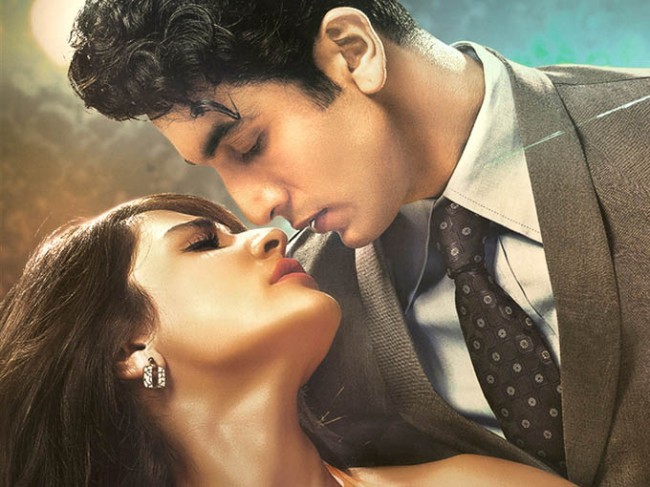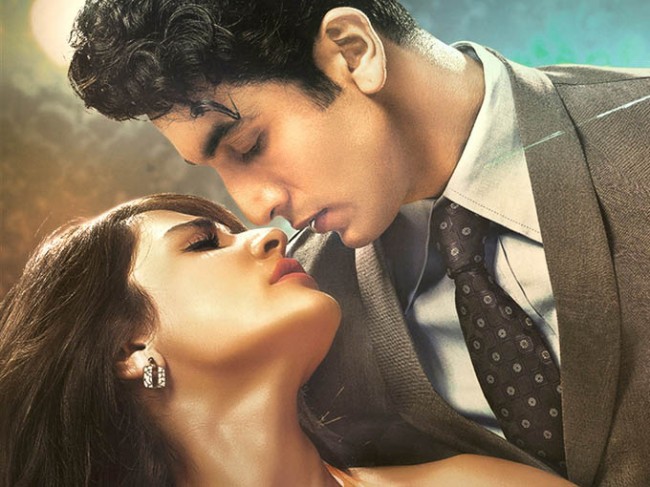By Troy Ribeiro
Film: “Bombay Velvet”; Cast: Ranbir Kapoor, Anushka Sharma, Karan Johar, Satyadeep Mishra, Kay Kay Menon, Vivaan Shah and Siddhartha Basu; Director: Anurag Kashyap; Rating: ***
Presented in a dark, moody and stylish manner, “Bombay Velvet” is a complex tale of city politics, ambition, greed and love. But on the face of it, it is a period story of a gangster — in sin-city Bombay — who wants to be “a big shot” someday.
The narration rolls off sometime in 1949, two years after India became independent, when little orphan Balraj lands up at the docks of Bombay. Soon he befriends Chiman, a petty thief and is sucked into the underbelly of the city.
Over a period of time, Balraj becomes street-smart. He soon graduates to being a street boxer who also indulges in petty crime. Starved of love and a sense of belonging, his only aim in life is to make it big.
Balraj’s chance encounter with the dubious media baron and entrepreneur Kaizad Khambatta has him baptised as “Johnny”. Seeing Johnny as an enthusiastic opportunist, Khambatta offers him an opening of a lifetime — to manage his restaurant-cum-pub, Bombay Velvet, in exchange of nefarious favors. An ever-obliging Johnny Balraj accepts the offer.
The plot gets complicated when Rosie, once a choir singer and now a wannabe crooner, is planted in Bombay Velvet by an influential editor, Jimmy Mistry, to thwart Khambatta’s business interests.
Romance brews. Egos clash. Greed and aspirations take center stage in the backdrop of city politics.
With fine characteristics borrowed from the Theatre of the Absurd, Anurag Kashyap blends two genres to create an unexpected noir film.
For the uninitiated, the Absurd genre, typically represents human existence as nonsensical and often chaotic. Absurdist works rarely follow a clear plot, and what actions occur, serve only to heighten the sense that characters are mere victims of arbitrary forces beyond their control. Dialogues are often redundant. The setting and passage of time within the tale is unclear and characters struggle to understand their world.
Here too the screenplay is complex and convoluted. With nothing much happening in terms of the story, the pace tortuously drags in the first half, but picks up momentum in the latter part of the film. The only thing that keeps you hooked is the brilliant production quality and the performances of the cast.
Ranbir Kapoor with his snazzy hairstyle and charming persona effortlessly gets into the skin of Johnny Balraj. Similarly, Anushka Sharma essays the part of Rosie Noronha with natural ease. Together, they make a wonderful pair. Unfortunately, the script only skims through their romance and hence you don’t feel strongly about them.
Karan Johar, making his acting debut in this film as the shady Kaizad Khambatta, is good. He gives a fairly composed and restrained performance but, in the overall scheme of things, he is never intimidating.
The few characters who shine are Satyadeep Mishra as Chiman, who plays Johnny Balraj’s friend and accomplice; Manish Chaudhary as Jimmy Mistry, the Editor, and Siddhartha Basu as Romi Patel, a shrewd politician.
Kay Kay Menon, as the ambiguous, investigating police officer, and Vivaan Shah, as Johnny’s driver, are wasted.
What peps these characters in this period saga are the costumes and their hairstyles. These are so reminiscent of the time and help in transporting the audience to that era.
Visually, with sepia tone frames and minute detailing of the sets, the era is well-captured. The streets, the tram lines, the over-crowded chawls, the telephone instruments and the dock yard transports you to Bombay, which is now lost to modernisation.
The background score along with the music matches the tempo of the narration, but with most of the songs having the same style and beat, the overall effect is monotonous and boring.
By and large, “Bombay Velvet” excels in its genre, but fails to leave an impact.






